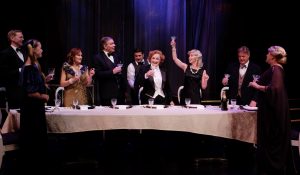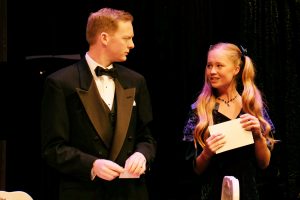Lamb’s ‘Marlene’ a Tribute to Family Storytelling
One of the often-lamented “lost arts” is the art of conversation. This lament comes in a variety of forms, but one of those forms is the family stories told over the dinner table.
I am old enough to have grown up in the era where family dinners were expected. The dinner table conversation was definitely not of the sparkling variety, but some of the best of these conversations occurred when my father would tell stories about his life before meeting our mother. One of which he was particularly proud was working for film star Jimmy Stewart during the time that both were serving during World War II. The connection to a famous individual seemed to make my father particularly proud. It made me proud as well.
I imagine that similar conversations went on in Anne-Charlotte Hanes Harvey’s home when she was a child and that her favorite was one about the evening that her father had dinner with film star Marlene Dietrich. It wasn’t just the two of them, though, and her father probably made a point of saying that he was mostly in the background, as he served as temporary babysitter to Ms. Dietrich’s daughter. It’s a story deserving of a tribute.
And that’s what Ms. Harvey has done. She’s written a fictional play (having its world premiere at Lamb’s Players Theatre through May 29) about this dinner party, which also functions as a tribute to her father. She’s set it at a fancy restaurant across the street from a hotel where her father (Brian Mackey), Marlene Dietrich (Deborah Gilmour Smyth) and Ms. Dietrich’s daughter (Avery Trimm) were staying. The party was being given by Leonore Wolff (Kerry Meads), the hotel owner. Also in attendance were Erich Maria Remarque (Jason Heil), author of All Quiet on the Western Front, the violinist Fritz Kreisler (John Rosen), Barbara Hutton (Rachel VanWormer), the Woolworth heiress, and a mysterious woman wearing a large diamond, named Bernadine Boubiel (Cynthia Gerber).
Now, dinner table conversation is hard to pull off as drama and next to impossible to pull off as an entire play. Louis Malle did it in his film, My Dinner With Andre (highly recommended), but that was a two-hander featuring quirky characters who became ever more charming as the conversation progressed. Most of the dinner table examples in theatre either have been played for laughs (You Can’t Take It with You, which Lamb’s mounted not so long ago) or as vehicles for revealing dire secrets (August: Osage County). Sometimes, the secrets can be combined with the laughs to produce a farcical effect (as in the musical, The Addams Family).
Ms. Harvey’s play does none of these things. Her characters have some secrets, it is true, but none is really dire. And, instead of becoming more charming as the dinner progresses, the characters become even more obnoxious as they consume the free-flowing champagne.
[quote]Most of the dinner table examples in theatre either have been played for laughs…or as vehicles for revealing dire secrets…[/quote]
Then, just as one might be giving up on this bunch, Ms. Harvey shifts gears. She moves her father from the periphery to the center and allows him not only to disclose many of the characters’ secrets but to humanize them in the process. Annoyance does a sharp turn into empathy, even respect, before the story’s conclusion. It’s a tribute that surely represents Ms. Harvey’s love for her father and the story that was so important to her as his daughter.
For some audience members, though, this turn will come too late – and even when it does come it takes the form of “telling,” as opposed to “showing” what happened. It’s a fine tribute, but it’s not particularly dramatic as a play.
There are a number of ways to resolve this problem as Dinner with Marlene moves forward from its world premiere production, but I’d guess that all of them will involve Ms. Harvey de-emphasizing the tribute part of her story.
For its part, Lamb’s has tried hard to present this play in its best light. Director Robert Smyth has cast the production with associate artists who are audience favorites, dressed them in Jeanne Reith’s lovely period costumes (including Dietrich’s signature tuxedo from the film, Morocco), and arrayed them across Mike Buckley’s banquet table of a set. Its program contains a timeline of events and a couple of pages of descriptions of people and locations the dialogue mentions, though if you don’t already have some understanding of Europe between the two world wars this information will be difficult to process.
In short, they’ve done their best to bring the play to life, and there are times when life does spring forth. Just not enough of them.
[box]Performs at Lamb’s Coronado theatre. Street parking is available, though check posted signs before parking at metered spaces. Run time is about two and a half hours, including one fifteen minute intermission. This review was based on the matinee performance on Saturday, April 29.
DOWNLOAD CAST AND CREDITS HERE[/box]

In addition to reviewing theatre for San Diego Story, Bill also reviews for TalkinBroadway.com. He is a member of the San Diego Theatre Critics Circle and the American Theatre Critics Association. Bill is an emeritus professor in the School of Journalism and Media Studies at San Diego State University.




